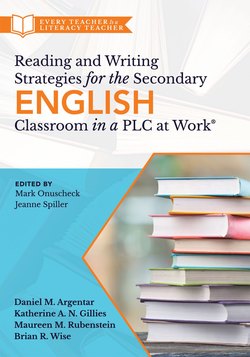Читать книгу Reading and Writing Strategies for the Secondary English Classroom in a PLC at Work® - Daniel M. Argentar - Страница 5
На сайте Литреса книга снята с продажи.
ОглавлениеTABLE OF CONTENTS
About the Series Editors
About the Authors
Preface
INTRODUCTION
Every Teacher Is a Literacy Teacher
The Need for Literacy Instruction
Disciplinary Literacy
About This Book
Wrapping Up
CHAPTER 1
Collaboration, Learning, and Results
Collaboration Within a PLC
Standards Analysis and Goal Setting
Identification of Students’ Literacy Skills
Identification of the Content-Literacy Connections
Wrapping Up
CHAPTER 2
Foundational Literacy Triage
Understanding Response to Intervention
Differentiating Instruction
Assessing the Level of Text Complexity
Using Fix-Up Strategies
Considerations When Students Struggle
Considerations When Students Are Proficient
Wrapping Up
CHAPTER 3
Prereading
The Importance of Prereading
Collaboration to Combine Literacy and English Expertise
The Four Ps of English Prereading
CCSS for ELA Connections
Strategies for Supporting Students in Prereading
Considerations When Students Struggle
Considerations When Students Are Proficient
Wrapping Up
CHAPTER 4
During Reading
The Need for Engaged, Active Readers
Collaboration Around During-Reading Activities
CCSS for ELA Connections
Strategies for Supporting Students During Reading
Considerations When Students Struggle
Considerations When Students Are Proficient
Wrapping Up
CHAPTER 5
Postreading
The Importance of Postreading Instruction
Collaboration Around Postreading Activities
CCSS for ELA Connections
Strategies for Supporting Students in Postreading
Considerations When Students Struggle
Considerations When Students Are Proficient
Wrapping Up
CHAPTER 6
Writing
Collaboration Around Consistent Language
CCSS for ELA Connections
Traditional Strategies for Supporting Students in Writing
Nontraditional Strategies for Supporting Students in Writing
Considerations When Students Struggle
Considerations When Students Are Proficient
Wrapping Up
CHAPTER 7
Assessment
Understanding the Role of Literacy-Based Assessment in the ELA Classroom
Matching Text Complexity and Reader Capacity
Monitoring Student Perceptions
Collaborating to Create Assessments
Using Rubrics as Assessment Tools
Providing Timely and Effective Feedback
Analyzing and Applying Data
Wrapping Up
Epilogue
Appendix: Reproducibles
Prereading Anticipation Guide
Quick-Write Prompts
Visuals
Beliefs and Opinions Survey
Text-Dependent Questioning
Five Words Recording Sheet
Student Self-Questioning Taxonomy
Postreading Checklist
3–2–1 Example
Two-Quote Paragraph Template
Evaluating Claim Statements and Supporting Them With Evidence
Narrative or Memoir Writing Exercise
Rubric to Provide Timely and Effective Feedback
References and Resources
Index
